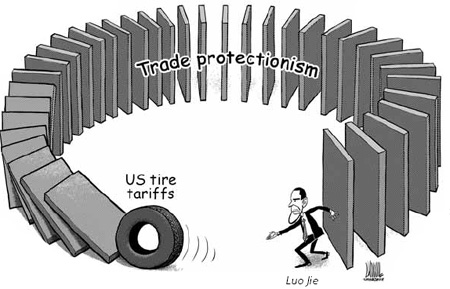
|
BIZCHINA> Review & Analysis
 |
|
How best to use WTO tools to tackle disputes
By Bian Yi (China Daily)
Updated: 2009-09-23 08:24 The Ministry of Commerce has launched anti-dumping and anti-subsidy investigations, according to World Trade Organization rules and Chinese laws, into some auto and chicken products imported from the US. This can be seen as a reasonable countermeasure against the recent US protectionist move against China-made tires. On September 11, US President Barack Obama signed a resolution on a months-long dispute between the two countries, imposing a whopping 35 percent additional import duty on China-made tires for one year. It will be followed by tariffs of 30 percent and 25 percent in the next two years. The White House says the move is aimed at protecting the US' domestic tire market. China and the US will try to resolve their dispute over the next 60 days through negotiations in accordance with WTO rules. If that fails, China can ask for a WTO panel to pass a ruling. As a growing economy with ever-expanding ties with the rest of the world, China has to include retaliatory measures in its action against trade protectionism. A restrained and measured retaliation sometimes works well to contain protectionist tendencies among trade partners. If exercised properly, it can help create a more stable trade environment across the world. Theoretically, the WTO can provide channels for member states to resolve their disputes. But experience shows that certain countries usually play with WTO rules because of the world trade body's lengthy dispute settlement procedures. Because of its traditional and cultural elements, China has long advocated negotiations to settle its trade disputes with other countries amicably. China's "negotiation-first" diplomacy has prevented it from adopting countermeasures to resolve disputes with other countries, even though it has fallen victim to protectionism many a time. Take Sino-US trade relations, for example. The US has created many disputes with China since the 1980s. But China has taken recourse to retaliatory action only in 1983. China's restraint has prompted the world's largest economy to indulge in more protectionist actions. Beijing's restrained attitude, however, has helped cultivate logical thinking among other countries and made them realize that it will not impose similar bans on the products it imports from them. China, nevertheless, has to do more to make people in its trade-partner countries realize the bigger risks their governments' protectionist measures could bring about. China needs to take potent countermeasures because they could weaken protectionist forces in such countries. China's reasonable countermeasures against the Republic of Korea (ROK) over the once-thorny garlic and onion trade dispute helped the two countries agree to strike a fair deal. Shortly after the ROK banned garlic and onion imports from China, Beijing announced a list of Seoul's products that would be denied access to the Chinese market. That resulted in an immediate compromise between the two countries.
More importantly, Beijing has to take some action to show China-bound investors that it has the resolve and capability to protect their legitimate rights and interests. Only by doing so can Beijing make overseas investors, with advanced manufacturing means, choose China as their ideal investment destination. This will also help boost Beijing's own overdrawn manufacturing sector in these times of global economic crisis. It is important that China curb the US' rising protectionist tendency in the early days of Obama's rule. Since the US Constitution authorizes the Congress to take decisions on foreign trade, American interest groups advocating protectionism and trade politicization can easily swing the country's trade policies. The economic policies and proposals mapped out by Obama shows the new US administration is probably more motivated to brandish the protectionist stick. The US auto and chicken imports that China has begun a probe into are worth about $2 billion, roughly what China's tire exports to the US amount to. Given their different development levels, scrapping of a $2-billion trade deal is not likely to cost many people their jobs in the US, something that Washington is worried the most about during the economic crisis. But about 100,000 people stand to lose their jobs in China's tire industry because of the US tariff move, Xinhua News Agency has quoted experts as saying. In its response to the US' unacceptable high tariffs on its tires, China has only adopted some reasonable retaliatory measures, which are confined to imports and exports. But it should consider a range of broader measures, including financial and other tools, to counter the US' tariff move. China's restrained action demonstrates Beijing's willingness to abide by WTO rules. It also shows that Beijing does not want to blow bilateral disputes out of proportion. Hence, the onus is now on the US to resolve bilateral trade disputes, more of which are likely to crop up because of the economic stress America is in.
 (For more biz stories, please visit Industries)
|